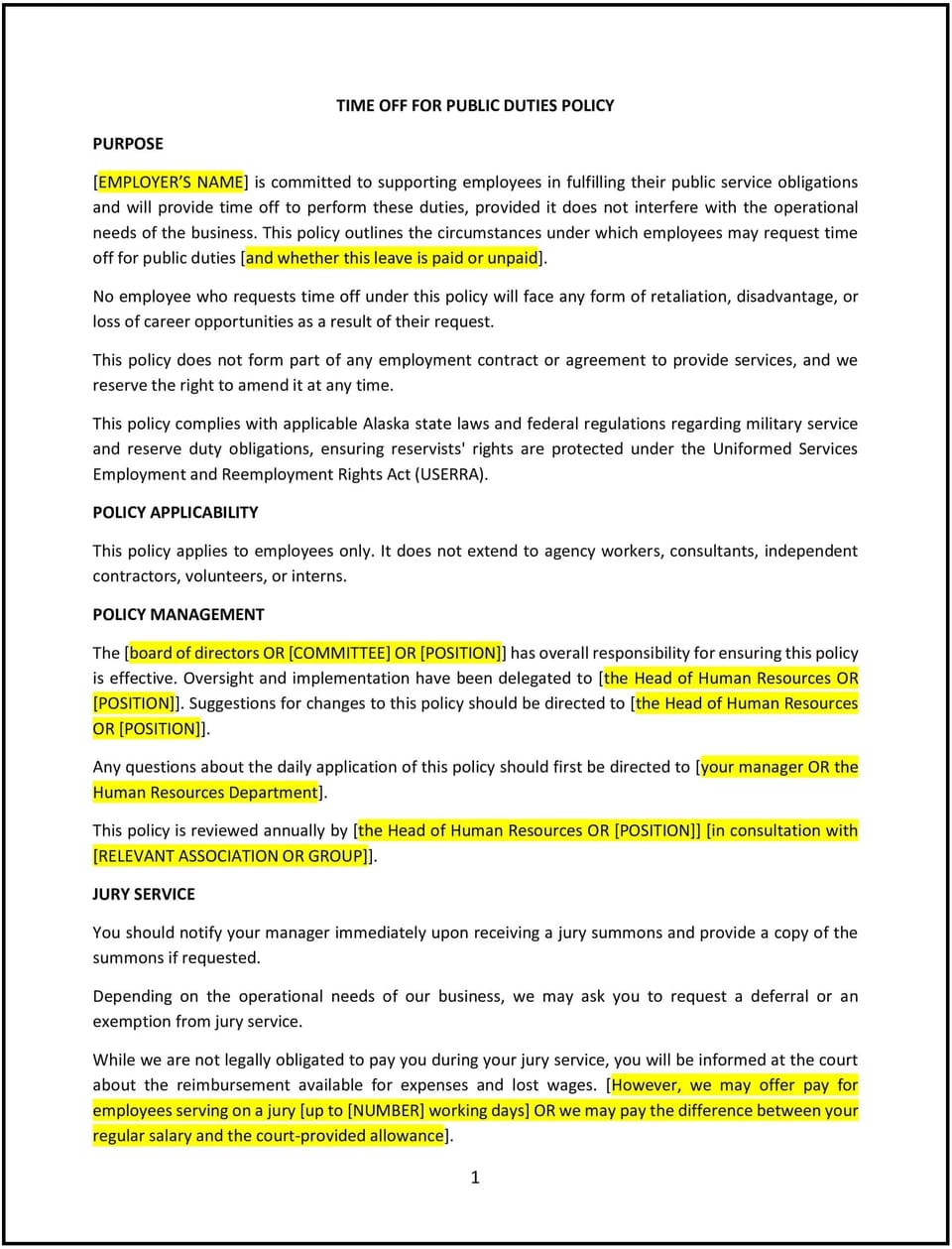Time off for public duties policy (Alaska): Free template

Time off for public duties policy (Alaska)
In Alaska, a time off for public duties policy outlines the guidelines for granting employees leave to fulfill civic responsibilities, such as jury service, serving on public boards, or participating in other government-mandated duties. This policy ensures compliance with legal requirements while supporting employees’ contributions to their communities. By implementing this policy, businesses can promote civic engagement while maintaining operational efficiency.
How to use this time off for public duties policy (Alaska)
- Define eligible duties: Specify the types of public duties covered under the policy, such as jury service, election official roles, or service on public bodies like school boards.
- Outline leave request procedures: Provide a clear process for employees to request leave, including advance notice and any necessary documentation.
- Address leave duration: Specify how long employees can be absent for public duties and whether this leave is paid, unpaid, or requires the use of accrued paid time off.
- Clarify job protection: Emphasize that employees taking leave for public duties are entitled to return to their roles without penalty, in compliance with state and federal laws.
- Communicate expectations: Inform employees about their responsibilities, such as notifying managers promptly and submitting proof of service if required.
Benefits of using a time off for public duties policy (Alaska)
A time off for public duties policy provides several advantages for businesses in Alaska. Here’s how it helps:
- Ensures compliance: Aligns with state and federal laws, reducing legal risks associated with denying leave for public duties.
- Supports civic engagement: Encourages employees to participate in public service, enhancing community connections and employee morale.
- Maintains consistency: Provides a structured approach to handling leave requests, ensuring fairness and transparency.
- Protects employee rights: Guarantees job security for employees fulfilling civic responsibilities.
- Promotes goodwill: Demonstrates the company’s commitment to supporting employees’ roles as active members of their communities.
Tips for using a time off for public duties policy (Alaska)
- Address unique local needs: Include provisions for duties relevant to Alaska, such as serving on regional boards or participating in state-specific initiatives.
- Plan for absences: Develop strategies to redistribute workloads or hire temporary help during employees’ public service leave.
- Monitor legal updates: Stay informed about changes in state and federal regulations regarding time off for public duties.
- Communicate policy clearly: Ensure employees understand their rights and responsibilities by including the policy in onboarding and employee handbooks.
- Update as needed: Regularly review the policy to reflect changes in laws, workforce needs, or company practices.
Q: How should I handle requests for time off for public duties?
A: Review the request promptly, ensure the employee provides necessary documentation, and plan for workload coverage during their absence.
Q: What types of public duties should businesses accommodate?
A: Duties typically include jury service, serving as an election official, or participating on public boards, as outlined by state and federal regulations.
Q: Do businesses need to pay employees during time off for public duties?
A: While payment is not usually required, businesses may choose to offer paid leave as part of their benefits. Ensure compliance with applicable laws.
Q: How can I prepare for employee absences due to public duties?
A: Develop a plan to redistribute tasks among team members or hire temporary support to minimize disruptions.
Q: How often should this policy be reviewed?
A: Review the policy annually or whenever changes occur in legal requirements, workforce needs, or operational practices.
This article contains general legal information and does not contain legal advice. Cobrief is not a law firm or a substitute for an attorney or law firm. The law is complex and changes often. For legal advice, please ask a lawyer.


